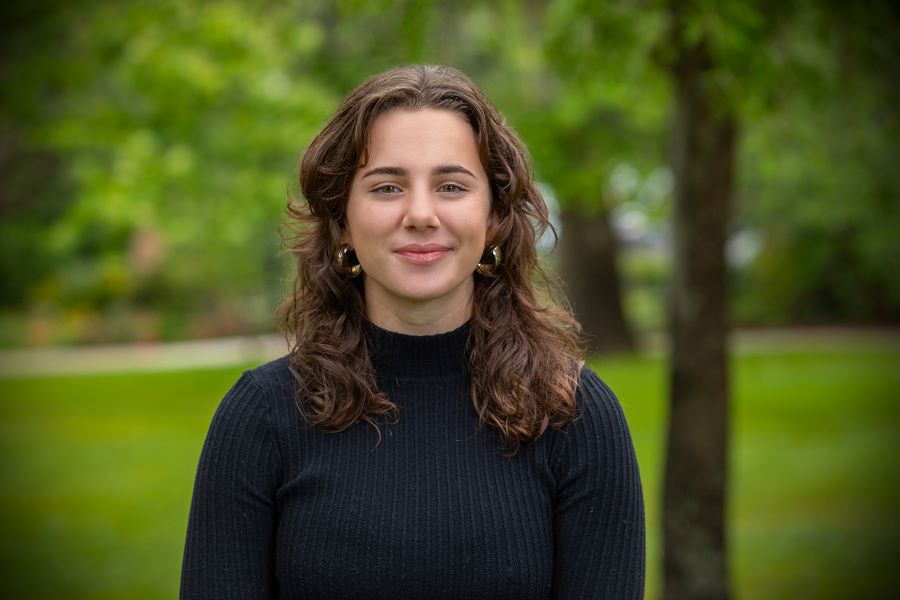Student Spotlight: Sydney Cole

Sydney Cole is a senior at Florida State University pursuing dual degrees in English with a concentration in editing, writing, and media in the Department of English, part of the College of Arts and Sciences, and sociology from the College of Social Sciences and Public Policy. She has been part of the Presidential Scholars Program, a premier undergraduate merit scholarship that invests in undergraduate students with potential to become transformational leaders, since 2020, and is currently a member of the FSU women’s swimming and diving team. Cole also conducts environmental research with the population and sustainability program for the Center for Biological Diversity on climate justice.
Tell us a little about your background, where you’re from and what brought you to FSU.
Originally, I’m from Omaha, Nebraska – a bit far from Tallahassee. I was initially drawn to Florida State for athletic opportunities, and I realized that the academic environment was also a perfect fit. After researching the English department, I decided FSU was the place for me.
What inspired you to pursue an English degree with the editing, writing and media track?
I have always loved the writing process; something about it feels very cathartic. Science, technology, engineering and math subjects never particularly interested me as much as the humanities. Toward the end of high school, I got very involved in journalism and realized I wanted to write for the rest of my career, whether it be reports, creative writing or anything else.
How do you think studying editing, writing and, media has helped you in pursuing your second degree in sociology?
EWM has given me the tools to effectively communicate the data I find in my sociological work. Recently, a lot of my work has centered around making environmental data accessible to the public, and developing the writing skills to communicate that is crucial. Qualitative data takes quite a bit of unpacking to understand, and that is where I have found my EWM skills to be most useful.
Tell us about the Presidential Scholars Program. What does being part of this program mean to you?
I’m very appreciative to be involved in the Presidential Scholars Program. Being part of a community of incredibly intelligent and creative people has undoubtedly made my work better. I was thankful to have those friends and peers when I first came to FSU, and I still am today.
What is something people don’t know about studying a discipline in the field of English?
English is often thought of as an “easy” degree, but the truth is, writing effectively takes quite a bit of time and patience and is an incredibly valuable and translatable life skill to learn.
What aspect of your areas of study do you find most rewarding?
I find the flexibility of my studies most rewarding. The English department is set up for efficiency, so students are often given quite a bit of agency to choose what they want to write about or work on. Focusing on our interests within writing makes us more engaged and productive students. Personally, I have become far more interested in my own work when I can redirect my papers or research projects to subjects of environmental rhetoric or advocacy.
What on-campus resources have helped you achieve success?
I’m very thankful for all my professors who have been so accommodating with my schedule. I’m often busy for athletic obligations, and I have always felt extremely supported by each professor I have.
What are some current goals or projects you’re working on?
Currently, I’m drafting an undergraduate thesis that utilizes a hybrid theoretical approach to create a heuristic, or problem-solving method, for a new environmental rhetoric — one that highlights the role of women in environmental policy statements while noting how such thinking could inform other policies and afford women agency in decisions about their own well-being. I should have that finished by the end of the year.
I’m also working on quite a few projects with my job for the Center for Biological Diversity. My current work focuses on the connection between human rights and environmental justice — looking at what resources are available to communities; studying demographic allocation and how historical precedent has formed inequities. With the center, I have begun creating databases that track information within climate plans on the federal, state and municipal levels. Part of this includes an analysis of the mention of gender within climate policies and how representation or a lack thereof can have a definite impact on women across the country.
Are there any faculty or staff who have helped or inspired you?
I’m incredibly thankful for my thesis adviser and associate professor of English, Tarez Samra Graban, who has made me a much more effective writer this past year. I discovered very quickly that writing a thesis is far different from composing essays for class — being able to articulate what I’m going to do in a project requires an extra layer of specificity. It requires establishing limits on the project, boundaries and more. Part of this writing process is also making sure that I’m not misrepresenting the words of the scholars I’m trying to discuss by making any assumptions within my project. Dr. Graban has been wonderful in helping me articulate exactly what I’m trying to say. I’m very appreciative of the time she has spent helping me.
Following your graduation, what are your plans? Even though you might miss FSU, what are you looking forward to once you graduate?
I plan to go to graduate school, so I’m currently applying around. I’m looking forward to new experiences and new research opportunities.
